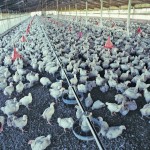
Tag Archives Antimicrobial

G7 told to act on antibiotics as dreaded superbug hits U.S.
The U.S. has recorded its first case of resistance to last-resort drug, but it has already surfaced in Canada and Europe

Soy is a promising antimicrobial agent
New testing shows plant isolates could replace failing chemical agents

Antimicrobial use in beef to meet new pressures
Antimicrobial resistance in the Canadian beef sector is currently low, but experts warn that producers should be cautious of overuse

Antimicrobial resistance in cattle means big changes coming
An alarming rise in resistance even has drug companies calling for producers to change their ways

Auditor general slams federal inaction on antimicrobial drugs for livestock
Little progress has been made after more than a decade of discussions

Federal government unveils plans to tackle drug resistance
Federal Health Minister Rona Ambrose has held a workshop with industry to discuss the plan

Livestock producers must end antimicrobial growth promotants
The risk from antimicrobial-resistant organisms found in meat is statistically low, but of great potential consequence

Federal scientists muzzled by PMO
Stance on antibiotic issues hard to pin down

Producers slowly becoming aware of antimicrobial resistance



